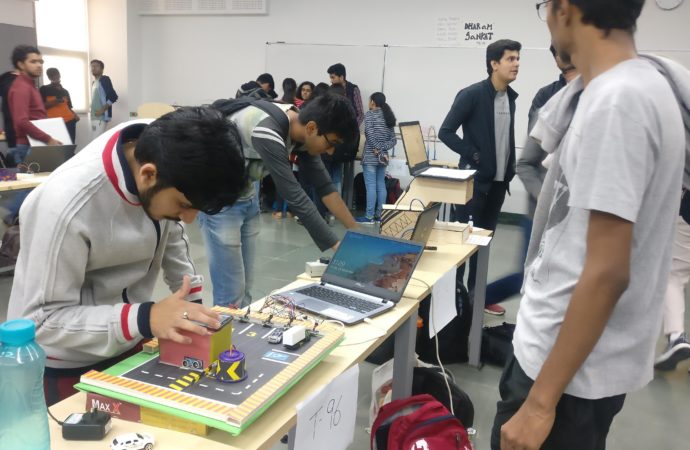An incubator is an academic organisational set-up that nurtures technology based and knowledge driven start-ups by helping them in surviving during the start-up period.
Manoj Meena and Sibabrata Das, founders of Atomberg Technologies started it as a student start-up at IIT B. They developed a disruptive yet simple technology and implemented in fans to make them energy efficient. Initially, the firm received tough competition from established brands even after its inception. Now owing to their disruptive technology in energy conservation and financial advisory by SINE (Society for Innovation and Entrepreneurship), they have raised a total of $11.2 million in funding. Their estimated annual revenue is approximately $15 million per year. The firm provides employment to over 400 employees and is now expanding its disruptive technology to other electrical goods and appliances.
An incubator is an academic organisational set-up that nurtures technology based and knowledge driven start-ups by helping them survive during the start-up period in the company’s history, which lasts around the initial two to three years. According to a NASSCOM report in 2018, India has more than 335 active accelerators and incubators with capacity to support more than 5000 start-ups annually. Professor Srivardhini Jha, faculty, Entrepreneurship area, IIM-Bangalore adds, “Entreprenuership and its incubation are action-oriented. Therefore, our courses have a large experiential component that is incorporated through several classroom exercises or a group project, which requires students to identify a venture idea and develop it into a business opportunity.”
CIIE.CO, India’s premier entrepreneurship and incubation centre at IIM-Ahemedabad has inspired over 1 million people through its publication (Stay Hungry Stay Foolish), mentored over 5000 start-ups, trained and accelerated over 1000 entrepreneurs through the programs, and provided seed capital to more than 190 (equity or debt) non-tech start-ups. Such start-ups have been able to leverage 25 times the seed capital provided, have made over more than 32 profitable exits and 7 acquisitions across in their investments. IIT-Madras Incubation Cell has brought 76 start-ups in market which has created more than 3000 jobs and 100 patents since its inception in 2013.
During the past two years, there was a two-fold increase in the number of patents incubated at IIT-Madras and the sectors that registered maximum start-ups were health-tech, machine-learning, artificial intelligence, manufacturing, and automotive. Speaking about non-tech ventures, the largest producer of clean cook-stove company Greenwave Grameen which was incubated at CIIE.CO sold over 8 lakh stoves and is generating income for over 480 rural saleswomen. Barrix Agro Science, an innovative Integrated Pest Management (IPM) solution provider that has synthesised 28 new pheromones, have 23 products possess a strong network with more than 550 institutions and general trade through more than 1800 dealers spread across 10 states and 4 countries.
The relationship between incubators and an ideating entity is governed by the terms of their association, which also defines the operating procedure between them. Generally, the terms of condition are open-ended with certain minimum working hours, deadlines or limitations for product appraisal, and limitations on conduct being the major chunk of the terms governing the talent of the incubator. These conditions lay down the schedule of incubation which is usually 18 to 24 months for renewal. It limits on time, resources, rights, and obligations along with operating criteria for each business incubator. Professor Srivardhini Jha adds, “As for the process of review, all incubators mandate at least a semi-annual review of the work carried out by incubator talent. This review is carried out by a committee of mixed staff, selection committee members as well as industry experts.”
IIM- Ahmedabad through its entrepreneurial and incubation cell CIIE.CO, helps in fostering technology-led innovations and business start-ups. Over the years, IIMA faculty and CIIE.CO have continued to work together in multiple ways to impact the innovation-driven entrepreneurship in India. Their work has primarily been in translation of technologies developed by entrepreneurs and researchers into commercially viable ventures, rather than confining themselves to technology development. According to Kunal Upadhyay, CEO, CIIE.CO, “Most enterprises fail because of a product-market fit issue rather than a technology failure. We leverage the managerial expertise to help in overcoming the product-market fit risks. CIIE.CO works very closely with industry partners and has corporates like BP, Godrej, JP Morgan and Philips; global foundations like Gates Foundation, Dell Foundation, Omidyar Network; multilaterals like IFC and ADB among others as long-term partners in supporting our start-ups.”
At the incubation centre of IIIT Delhi, the start-ups get mentoring from faculty of IIIT Delhi in areas such as artificial intelligence and IoT, data science & big data, mobile computing, cyber security, human computer interaction, computational biology, smart cities, health technology, image processing, and computer vision. The centre also facilitates cross-collaboration of start-ups with faculty researchers and makes high-tech labs accessible for budding entrepreneurs. Mr. Alok Nikhil Jha, Chief Operating Officer, IIIT-Delhi Innovation & Incubation Center recalls, “iNICU Medical Pvt Ltd. was a med-tech company incubated at the centre. The idea didn’t receive much attention earlier as it strived to make early diagnosis of critical diseases and improving healthcare for neo-natal patients. After its tie-up with faculty researchers at IIIT-D, the company was acquired by Child Health Imprints and received a funding of $2.3 million in 2019.”
The process of finishing incubation is traditionally known as ‘graduating’ and most incubators have differing criteria for gauging when a talent can graduate from an incubator and what that entails from both the incubator as well as the talent. Some of these criteria include self-sustenance in terms of revenue stream, selling the venture to a larger company, expiry of the period specified in the terms of agreement etc. Pyoni Bhatt, Chief Executive Officer, SINE-IIT Bombay concludes, “SINE-IITB offers its incubatees several benefits that help them grow their enterprise along the lines of technology development, R&D and corporate membership. These include infrastructure benefits, funding, networking, mentoring, visibility, advisory etc. In addition to this, SINE-incubated start-ups become a part of a perpetual ecosystem that aids growth of other start-ups. AllinCall Research and Solutions Pvt. Ltd (www.allincall.in), CareNx Innovations Pvt. Ltd. (www.carenx.com), Inceptor Technologies Pvt. Ltd. (www.innovisiontech.co) etc are few other names incubated by SINE.”


















Leave a Comment
Your email address will not be published. Required fields are marked with *